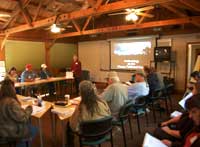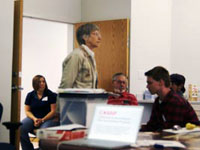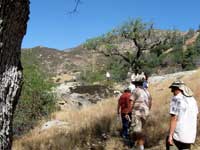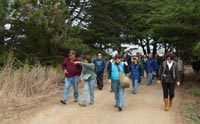Memo [revised]
Date Fall, 2019
To: Archaeologists and other personnel who work for public agencies
From: Beth and Chris Padon, Partners for Archaeological Site Stewardship, PO Box 7577, Long Beach, CA 90807
Subject: Hosting California Archaeological Site Stewardship Program (CASSP) volunteer training workshops
Thank you for your interest in hosting a CASSP workshop to train new volunteer site stewards. Although the numbers vary, you can expect that 20 to 25 people will participate in the workshop, and about one-third of them will join your local team of volunteer site stewards. (The others will join teams that are closer to home for them, or postpone active volunteering for now.) The cost of the workshop is $5,000, which is paid to the Partners for Archaeological Site Stewardship. Usually it takes several months to plan the workshop and recruit the participants.
Background
The California Archaeological Site Stewardship Program is administered by Partners for Archaeological Site Stewardship (PASS). PASS, a recognized 501(c)(3) organization, oversees CASSP activities and provides administrative dupport and professional advice and guidance.
CASSP volunteers regularly visit assigned sites on public lands and report on their conditions to their local coordinating archaeologist, who works for the land management agency responsible for the sites. By regularly inspecting sites, problems are detected early, when they can more easily be corrected. Volunteers attend a two-day training workshop before they become site stewards. Site stewards work in their local areas, in teams coordinated by a professional archaeologist who works for the land management agency responsible for the sites.
Workshop overview
The volunteer training workshop consists of classroom sessions all day Saturday (usually from 9:00 am to about 4:00 pm), and a field trip on Sunday (usually from 9:00 am to about 1:00 or 2:00 pm). Workshop participants pay a fee of $25 per person to PASS. During the classroom sessions, we discuss confidentiality of site location information, and site stewards sign a confidentiality agreement. On Sunday, we visit two or three sites. Before the end of the field trip, we distribute caps to the participants, and take a group picture. We provide workshop participants with notebooks, lunch on Saturday and refreshments on both days, CASSP hats.
Saturday speakers
We will speak about CASSP, site confidentiality, safety concerns, and legal background; and moderate the workshop and lead the discussions.
The host agency archaeologist speaks about local archaeology. This presentation will be about 15 to 30 minutes long, depending on the number of other scheduled speakers. Also, we need background material about the local archaeology from the host agency archaeologist to put in the notebook.
We encourage you to ask other agency staff to speak about their disciplines, if you think that it would help the volunteers. Your office supervisor may want to visit the workshop on Saturday morning to welcome the participants. And we strongly encourage that a law enforcement ranger talk about safety and his or her duties (10-15 minutes).
Outside experts may also speak at the workshop, if you think it’s appropriate. Sometimes it’s very helpful to hear from a representative of a local Native American group.
Sunday field trip
We suggest choosing 2 or 3 sites to visit on Sunday, sites that are accessible and are not too fragile. It is important to have the site records on hand. There's no agenda of speakers on Sunday. The field trip has several goals. People can see a real site, and learn what they should be observing when they make their site trips. If the sites that we visit are some of the ones that you want inspected, then people can sign up for them right away. If the site requires more than one visit per month, you may want to assign it to several volunteers. It always takes more time than expected for everyone to meet at the gathering spot, travel to the sites, and explore them, so planning to visit two to three sites is enough for one day. Often, there are informal discussions and questions about the artifacts and sites and we practice completing the site visit form with the volunteers.
Because the field trip builds on information presented on the previous day, and because we are visiting actual archaeology sites to point out artifacts and features, only people who attended the Saturday session and signed confidentiality forms are invited to participate on the Sunday field trip.
We'll probably end the workshop about 1:00 or 2:00 pm. This gives people time to drive home before dark.
Enrolling participants
In order to register for the workshop, people send us their name and contact information. We will collect the $25 fee at the door on Saturday. People can call, e-mail, or use regular mail to register. We close registration on the Monday before the workshop weekend, so that we have time to prepare the workshop notebooks and arrange for lunches.
Preparing for the classroom training
The agenda contents are generally the same; we will work with you to develop your Saturday agenda which will identify speakers, topics, and times.
We will make arrangements for lunch, which consist of sandwiches, with salad, fruit, and dessert. Also, we’ll bring sodas, juice, and bottled water, and coffee. These arrangements are greatly simplified since there are kitchen facilities next to the conference room.
Workshop training notebook
Most of the contents of the training notebook remain essentially the same from workshop to workshop, except for the section about the local archaeology and the Safety section. We will update the contact page in the Safety section of the notebook with phone numbers at your agency, and at other appropriate agencies such as the district office and county sheriff. Let us know if you have specific contact information that we should include in the notebook. Also, we can include your agency volunteer forms in the notebook, if you want to distribute them at the workshop.
Please contact us if you have any questions. Thank you.





